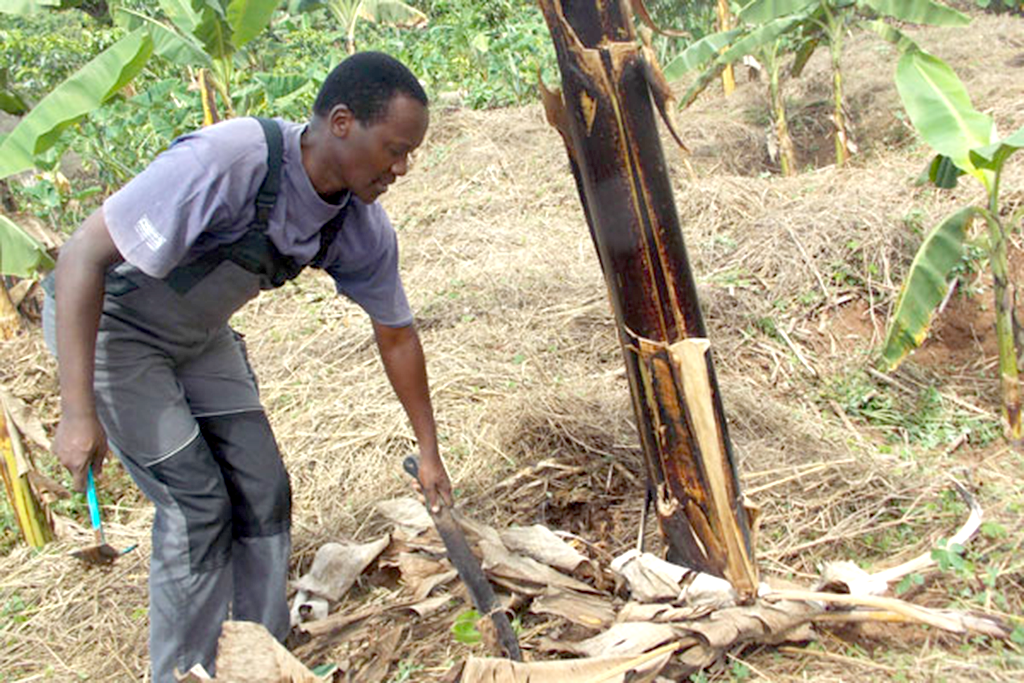By Michael J Ssali
Father Edward Ssekabanja has turned his parent’s land into a farm to feed himself, some parishioners and make money, writes Michael J Ssali.
Father Edward Ssekabanja, the chancellor of Masaka Diocese, is a practicing farmer apart from his priestly duty of preaching the Gospel. He, however, practices farming for a number of reasons.
“I do not want my priesthood to separate me from my origin,” he told Seeds of Gold recently at his farm of about six acres located at Manzi Village in Kyannamukaaka Sub-county in Masaka District.
“Farming is what my parents did for a living. We ate the food that we grew on our gardens. Farming made our education possible. Our parents earned money out of it. Our father is dead but our mother is still alive but she is getting weak due to old age.”
How he does it
He usually drives from Kitovu where he works as chancellor, to Manzi Village to attend to his farm.
“My brothers and sisters live and work far away from home but I happen to be working and living near home and I have the duty to take care of her. She must continue eating food from the same piece of land as she used to do when we were growing up,” Ssekabanja says.
“She gave me the farming skills and I should use them to take care of her needs by applying them right here where she used to provide for us. Even as a priest myself I need money to sustain myself and I know there is a lot of money to be got out of farming.”
Farming keeps him fit
His priestly duties sometimes cause him to relocate his time and attention to other parts of Uganda for long periods and when Seeds of Gold visited, he was rehabilitating a part of the banana garden that had become rather bushy and unproductive during the two years or so that he had been unable to attend to it.
He was busy trying to rejuvenate the banana garden. “The banana bunches from here were so big and I remember a woman from Nyendo in Masaka Town frequently coming here to buy bananas,” he recalled.
His other reason for farming is that it is a form of physical exercise which he has to do to keep physically fit.
“I personally do a lot of the hard work in the garden, such as pruning the banana trees and I sweat, which I think is good for my health. I also feel really fulfilled to be doing what my parents taught me to do albeit in an improved way now given the new practices that we have been taught in modern agriculture such as digging the water gullies, rainwater harvesting, mulching with grass, and drilling water from the ground.”
Water for irrigation
Although his farm is located rather close to the swamp, some men were busy digging a hole for drilling underground water.
“Underground water is the cleanest,” he said. He is aware of the possible vagaries of climate change which include prolonged draught and the reason he has dug gullies is to make water sink well into the soil of his garden, which is all well covered up with mulch.
He also wants to preserve the natural environment. He is particularly interested in preserving the local banana varieties which he is growing.
Diversifies into tree growing
Father Ssekabanja has about an acre of forest as part of his farm and he has no intention of cutting it down. He plans to expand the project by planting more trees such as eucalyptus and pine. “This forest serves as my lungs. It is our source of fresh air. The forest is also the habitat for wild life. It is one of the reasons that I have chosen to plant our Buganda natural banana species.”
Next to the forest on the eastern part is a large field of sweet potatoes. His mother, who lives with a househelp, cannot consume all the sweet potatoes grown on the field. Most of the sweet potatoes are sold at Kabwoko Secondary School. He has a plan to relocate the sweet potato garden of about an acre to the western side of the forest.
“Potatoes should be nearer to my mother’s house because she is one of the main reasons I am engaged in agriculture.”
Plans for a coffee garden
“I intend to plant coffee in the near future and I believe coffee will do well where the potatoes are growing currently,” he says. He plans to grow cloned Robusta coffee which is known to be very high yielding. In their struggle to help their flock fight poverty Catholic priests often speak about the importance of agriculture in improving household incomes. His other reason for engaging in farming is to practice what he preaches. His way of sustaining soil fertility is mulching with grass and applying animal manure purchased from the neighbourhood. He has also dug gullies that carry run-off rain water from a nearby road to his garden.
He believes that the water brings along soil nutrients as well. Along the gullies he grows cassava to further enhance food security in the home.

